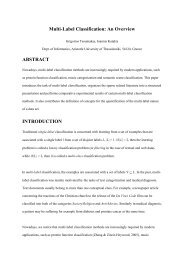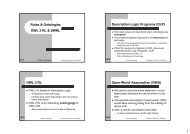Create successful ePaper yourself
Turn your PDF publications into a flip-book with our unique Google optimized e-Paper software.
7. Knowledge Specification Language 99<br />
<strong>flex</strong> toolkit<br />
to slots or modify the facts / exceptions in the database.<br />
Its use is similar to a data statement in establishing the initial state of some<br />
problem, but, unlike data, anything executed by a do statement in this way<br />
is not re-established by the <strong>flex</strong> routine restart/1. A do statement is for<br />
executing directives once at compile time, and once only.<br />
The general format of a do statement is as follows.<br />
do directive(s) .<br />
Examples<br />
do the contents of jugA become 2<br />
and jugB`s contents become jugB`s capacity - 2<br />
and remember that danger_level( yellow ) .<br />
do c1 is a new car whose engine_size is 1100<br />
and c1`s model := 'Whizzo'<br />
and c1`s colour := metallic_blue .<br />
To illustrate the difference between do and data, consider the following<br />
example.<br />
frame widget<br />
default screws is 0 and<br />
default bolts is 0.<br />
relation get_widget( W, S, B )<br />
if W is some widget<br />
whose screws is S and whose bolts is B.<br />
do w1 is a new widget<br />
whose screws is 50 and whose bolts is 10.<br />
data new_widgets<br />
do w2 is a new widget<br />
whose screws is 20 and whose bolts is 30.<br />
We may find the current instances of widget using the query<br />
get_widget/3. Initially after compilation, there will be two widgets, w1<br />
and w2, as declared by the data and do statements above.<br />
?- get_widget( W, S, B ).<br />
W = w1, S = 50, B = 10<br />
W = w2, S = 20, B = 30<br />
However, if we precede the query with the <strong>flex</strong> call to restart/0, which<br />
reinitialises the <strong>flex</strong> workspace, we will see that the widget w2 is restored (as<br />
in the data statement) but the widget w1 is not restored (because it was only<br />
declared in a do statement).<br />
?- restart, get_widget( W, S, B ).<br />
W = w2, S = 20, B = 30








